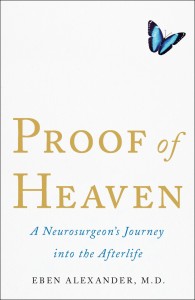 On November 10, 2008, Eben Alexander was admitted to the Lynchburg General Hospital emergency room with excruciating back pain. Within four hours he slipped into a deep coma that lasted seven days. At the end of those seven days, he opened his eyes and thrashed around in bed. After the doctor removed his ventilator, Alexander took his first unassisted breath in a week, calmed down, and then said, “thank you.” Looking around the room at his family and doctors, he smiled and said, “All is well. Don’t worry, all is well.”
On November 10, 2008, Eben Alexander was admitted to the Lynchburg General Hospital emergency room with excruciating back pain. Within four hours he slipped into a deep coma that lasted seven days. At the end of those seven days, he opened his eyes and thrashed around in bed. After the doctor removed his ventilator, Alexander took his first unassisted breath in a week, calmed down, and then said, “thank you.” Looking around the room at his family and doctors, he smiled and said, “All is well. Don’t worry, all is well.”
This book about his Near Death Experience rocketed to #1 on The New York Times best-seller list. Oprah did an hour-long special about it. The publisher has printed a million copies.
Before his NDE, Alexander was a friendly sceptic. He wasn’t religious, and only went to church on Christmas and Easter. He had spent twenty-five years as a neurosuxrgeon, including fifteen years at Harvard Medical School. He had published over 150 peer-reviewed scientific articles. Faith in empirical science was his only creed.
His eventual diagnosis was so rare that he made medical history. Somehow he had contracted spontaneous E. coli bacterial meningitis. The doctors never determined how or why. No one could find even one other case like his. “Officially, my status was ‘N of 1,’ a term that refers to medical studies in which a single patient stands for the entire trial.”
Alexander’s prognosis was catastrophic. His type of meningitis was almost always fatal, and so his doctors gave him little chance for recovery. His brain’s neocortex had shut down; he describes it as “inoperative.” It wasn’t that his brain was working improperly or poorly, he says, but that “it wasn’t working AT ALL” (his emphasis).
Such was Alexander’s medical condition. But his book is mainly about the “profound spiritual experience” he had when he was “completely free of the limitations of my physical brain.” Whereas Alexander has no memory of any events during the week of his coma, he retains absolute clarity about what happened “outside my brain.” He now believes something that’s antithetical to the materialist model of all brain science — that consciousness exists entirely independent of the brain.
I won’t spoil the story, nor address the fire storm of controversy his book has ignited. Suffice it to say that Alexander gives a vividly detailed description of his NDE. “We will show you many things,” an angelic being told him, “but you will be going back.” One message in particular was more important than all the rest.
Alexander compares his NDE to lifting a veil. A veil can function like a filter, and so can the brain. Although the spiritual realm beyond the brain is available to us, “during the brain-based, physical portion of our existence, our brain blocks out, or veils, that larger cosmic background, just as the sun’s light blocks the stars from view each morning.” This brain-filtering is good and necessary for life on earth; imagine if you always heard every sound at once. But this brain filtering also obscures the more important realm of the spirit, unless we take deliberate steps to see “beyond the veil.”
The title of Alexander’s book is unfortunate. No amount of debate can conclude whether there’s a “heaven” beyond normal consciousness. To me this doesn’t matter, because I already believe that. What’s important is not Alexander’s medical miracle but his spiritual message — that despite this veil of tears which is life, and whether you feel it or not, nothing can separate you from the Perfect Love that exists at the heart of the universe. “This is the reality of realities,” he writes, “the incomprehensibly glorious truth of truths that lives and breathes at the core of everything that exists or that ever will exist.”
reviewed by Journey with Jesus webzine, www.journeywithjesus.net, with founder Dan Clendenin’s permission
